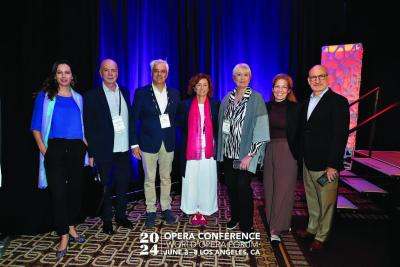The World Opera Forum held in Los Angeles from 3 to 5 June was an exciting exchange of experiences and information. Marc Scorca, President/CEO of OPERA America, welcomed us all and provided a great venue, excellent performances, lively receptions, and stimulating discussion groups. Delegates came from all around the world, including Australia, UAE, South Africa, South Korea, Brazil, Chile, Canada, the USA, and many of our Opera Europa family. Laura Berman from Staatsoper Hannover, Laura Canning from Opera North, and Henning Ruhe from GöteborgsOperan were part of the Opera Europa team and have kindly written about their impressions of the forum.
Everything’s bigger in the US, they say. Well, that’s certainly true of the ambition for this world opera forum. Only three days, only four sessions, but we were going to touch on the existential, the human, the vital. What a gift, to step out of the day to day to start to build the future we want to see for the art form we all love so much. I met extraordinary colleagues whose communities are all in different places on their journey with opera. 'We’ve only really had opera for 15 years,' said Paolo Petrocelli from Dubai, 'we’re not worrying about how to refresh the canon quite yet!'. But the message that stays with me more than anything is a line from Bibian Kalinde – an inspirational music educationalist from Zambia. 'You keep talking about opera as a western classical art-form, but really, is there anything more universal than singing with an open heart?' Long may we continue to do so.
Laura Canning, CEO/Artistic Director, Opera North Leeds
The World Opera Forum was thought-provoking. The participants represented companies of very different natures and backgrounds. All seemed to agree that theaters have a social responsibility, but passionate discussions emerged about the specific implications of this and the role of art in the process. The performances we saw, ranging from grand traditional productions to experimental showcases, raised questions about how to implement our ambitions within the constraints of our business. Honored to participate in the panels, I encountered very diverse viewpoints, each shaped by distinct realities. Should institutions prioritize serving the art or the communities? Who defines these communities and the priorities? Is art an end goal or a means to an end? And how do we present the classic repertoire that still attracts the most audience and financial support? No universal answers, but a rich tapestry of perspectives emerged, hopefully inspiring collective growth.
Henning Ruhe, Opera Director, GöteborgsOperan
The World Opera Forum truly drew people from all over the world. The conference was set up so that delegates and attendees could exchange information in many different ways: in large panel discussions with questions from the floor coming through an internet portal, in small break-out sessions also organized as panels with questions through the internet and in informal meals, receptions. Naturally there were performances to see as well. The mix of delegates enabled us to have highly valuable opportunity to learn about differences, exchanges thoughts and opinions about common problems and issues, and hear about how colleagues in varying institutions think about producing opera today. It is clear that in the US productions of new operas, which reflect current issues and examine the stories of underrepresented peoples (Blacks, Latinos and First Peoples) are increasingly popular. The areas of transformation which are now a huge subject in Germany: diversity, inclusion, digitalization and sustainability, were all hot topics at the forum. (Perhaps inclusion of mentally and physically impaired people plays less of a role.) Here opinions and ideas varied widely. The discrepancy between the interests among audiences – particularly between the 60+ generation and generations Y and Z is strongly felt just about everywhere – in Latin America, in Asia and in the USA. In one panel in which I participated an interesting question came up: Perhaps the changes in society could have significance for how we define artistic quality – should these aspects play a role in our definition? How important today is technical proficiency and virtuosity? Is raw emotion increasingly important? (Pre-1945 artistic quality was also determined by other parameters than we use today.) As in all meetings of this kind, the conference enabled colleagues to meet and discuss. In comparison with other conferences, the discussions were intense and one had the feeling that the time had been used to the maximum.
Laura Berman, Operndirektorin, Staatsoper Hannover


